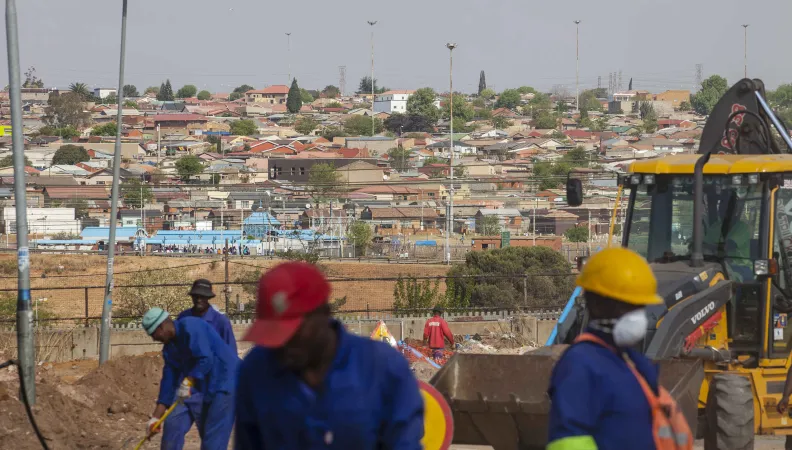 Legal notice EU (project) How could the Social Relief Distress grant be redesigned to maximize impact on poverty and unemployment reduction, while being sustainable in the longer term? The Extension of the EU-AFD Research Facility on Inequalities will seek to answer this question in partnership with SALDRU (University of Cape Town – Southern Africa Labour and Development Research Unit).
Legal notice EU (project) How could the Social Relief Distress grant be redesigned to maximize impact on poverty and unemployment reduction, while being sustainable in the longer term? The Extension of the EU-AFD Research Facility on Inequalities will seek to answer this question in partnership with SALDRU (University of Cape Town – Southern Africa Labour and Development Research Unit).
Context
South Africa’s Economic Reconstruction and Recovery Plan was launched in October 2020 by the Presidency in response to the economic impacts of the Covid-19 pandemic. Besides the Presidential Employment Stimulus program, it included emergency social protection measures, among which the introduction of a special Covid-19 Social Relief of Distress grant (SRD), providing ZAR350 per month for unemployed people not covered by any other form of support. The South African government now seeks to develop options for the future of SRD grant.
This project is part of the Extension of the EU-AFD Research Facility on Inequalities. Coordinated by AFD and financed by the European Commission, the Extension of the Facility will contribute to the development of public policies aimed at reducing inequalities in four countries: South Africa, Mexico, Colombia and Indonesia over the period 2021-2025.
Objectives
The objective of this research project is to produce motivated recommendations on how the SRD should be designed going forward into the longer term, in order to maximize the impact of the grant on employment outcomes and to ensure it effectively reduces poverty, while maintaining its cost to an acceptable level:
- To maximise the impact of the grant on employment, the project needs to understand how to design and label the grant to encourage its use for job search.
- To ensure the grant effectively reduces poverty, the project must figure out the most cost-effective way to target and assess the eligibility of recipients. Moreover, poverty reductions can be scaled up by determining measures that could encourage take up among the most disadvantaged.
Once these goals have been achieved, and in order to inform public decision-making, these findings must be communicated to a number of stakeholders in government and civil society.
This project is part of a wider research program conducted with several South African research centres and in close collaboration with the South African Presidency. Four other research projects analysing the externalities of the Covid-19 stimulus policy are currently being developed as part of the first pillar of the Extension's activities in South Africa.
Method
This research project uses the model generated to conduct the 2014/2015 fiscal incidence assessment and introduces updated data for 2019-2021. It simulates five scenarios around eligibility criteria, targeting mechanisms, value, disbursement model and conditionalities and computes the potential impact on poverty and employment outcomes.
Publications
You will find below the research paper related to this project:
Contact
- Anda David, AFD Research Officer
 AFD and the Economic Research Forum (ERF), in collaboration with the Egyptian Central Agency for Public Mobilization and Statistics (CAPMAS), are supporting the implementation of the fifth wave of the Egypt Labor Market Panel Survey (ELMPS). This new wave of the ELMPS survey aims to highlight the evolution of the Egyptian labour market, economy and society and thus provide essential data to analyze the effects of public policies in Egypt.
AFD and the Economic Research Forum (ERF), in collaboration with the Egyptian Central Agency for Public Mobilization and Statistics (CAPMAS), are supporting the implementation of the fifth wave of the Egypt Labor Market Panel Survey (ELMPS). This new wave of the ELMPS survey aims to highlight the evolution of the Egyptian labour market, economy and society and thus provide essential data to analyze the effects of public policies in Egypt.
Context
Labour market panel surveys (LMPS) are household surveys that allow to observe the evolution of labour market dynamics by following the same individuals over several years. Conducted in Egypt in 1998, 2006, 2012 and 2018, these surveys have become the focus of research on the labour market, human development, migration, the (de)composition of families and social protection. They make it possible to analyse the impacts of the various tax and monetary reforms undertaken in the country. The data also sheds light on the opportunities and challenges women face in the labour market.
Goal
This research partnership supports the implementation of the fifth wave of the ELMPS survey in Egypt by providing co-financing dedicated to data collection and dissemination. The objective of this collaboration is to support the production of the wave, as well as presentation chapters of this wave, four of which will be published as research papers to deepen knowledge on the Egyptian labour market. Particular attention will be paid to the analysis of the labour market situation in Egypt following the Covid-19 pandemic, thus providing relevant insights in this post-pandemic context.
Method
The new ELMPS 2023 wave is largely based on the questionnaire of the 2018 ELMPS survey, which addressed issues such as demography, employment, income, migration and well-being.
This edition differs from previous editions in several ways:
- It incorporates questions dedicated to assessing the impact of the Covid-19 pandemic;
- It broadens its coverage by including new components, such as the digital economy (gig economy) and employment measurement in the emerging green and circular economy sectors;
- It provides for a skills-based module, with the inclusion of a wider variety of skills, which will assess the extent to which workers' skills match the needs of the labour market.
These improvements are intended to ensure more comprehensive and representative data, thus providing a solid foundation for informed public policy development.
Results
The ELMPS 2023 database will be made available on the ERF website.
Research papers will focus specifically on:
- The role of internal migration in territorial dynamics;
- The evolution of the insurance system and its coverage;
- Technology in the labour market and its use;
- The green economy and the labour market.
A book will be published covering the themes of 1) labour supply; 2) employment structure; 3) inequalities; 4) mismatch between labour supply and demand; 5) gender and occupational segregation; 6) international migration; 7) social protection; 8) technology in the workplace; 9) green economy; 10) small and medium-sized enterprises (SMEs); 11) care activities (paid and unpaid); 12) food security and resilience to shocks.
Contacts:
- Dr. Cecilia Poggi, Research Officer, AFD
- Prof. Ragui Assaad, Humphrey School of Public Affairs, University of Minnesota
